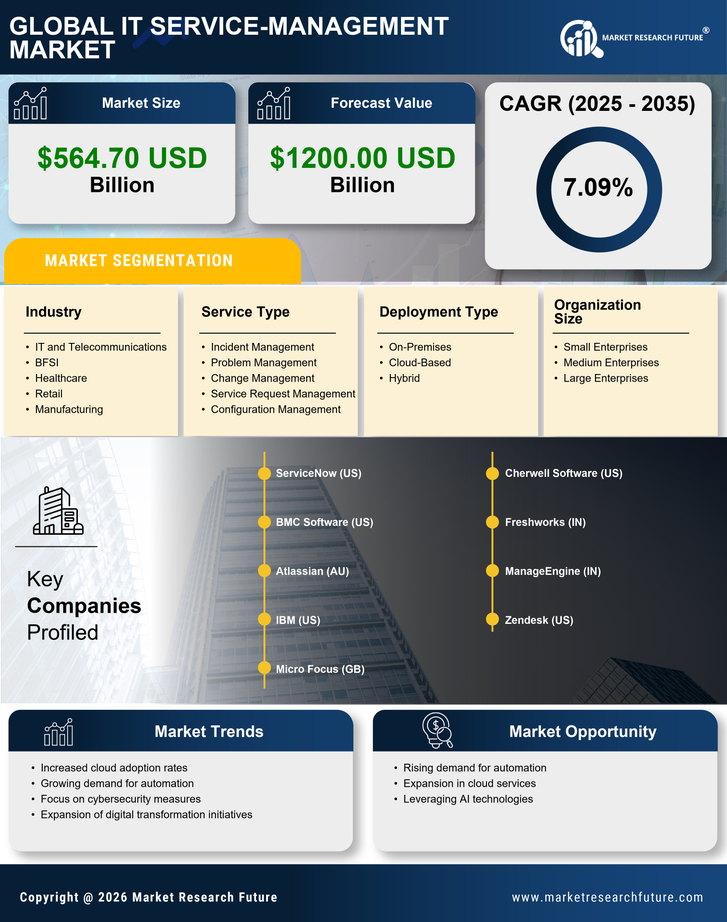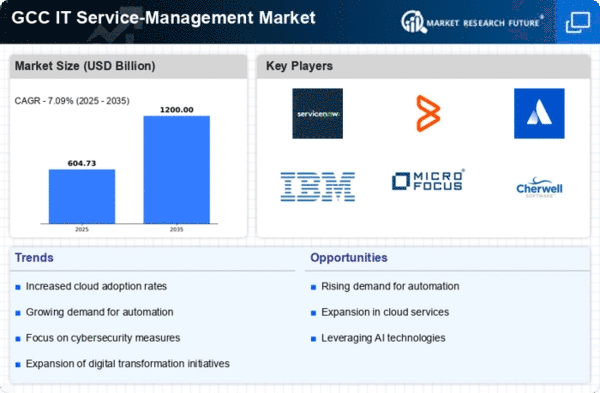Growing Cybersecurity Concerns
The escalating concerns regarding cybersecurity threats are propelling the IT Service-Management Market in the GCC. Organizations are increasingly prioritizing the implementation of robust IT service management solutions that incorporate security measures to protect sensitive data. The rise in cyberattacks has prompted businesses to invest in comprehensive IT service management frameworks that ensure compliance with regulatory standards. This focus on security is likely to drive the adoption of IT service management tools that offer integrated security features. As organizations seek to mitigate risks and safeguard their digital assets, the market is expected to experience a growth rate of around 10% annually, reflecting the critical need for enhanced cybersecurity measures.
Increased Focus on IT Governance
The it service-management market is experiencing a surge in demand due to the heightened focus on IT governance within organizations in the GCC. Companies are recognizing the importance of aligning IT services with business objectives to ensure compliance and risk management. This trend is underscored by the implementation of frameworks such as ITIL and COBIT, which provide structured approaches to IT service management. As organizations strive to enhance accountability and transparency in their IT operations, the adoption of these frameworks is likely to grow. This shift not only improves service quality but also fosters trust among stakeholders. Consequently, the IT Service-Management Market is expected to benefit from this increased emphasis on governance, with a projected growth rate of around 12% annually over the next few years.
Emergence of Remote Work Solutions
The rise of remote work arrangements in the GCC is significantly influencing the IT Service-Management Market. Organizations are increasingly adopting IT service management solutions that facilitate remote collaboration and support. This trend is driven by the need for seamless communication and efficient service delivery in a distributed work environment. As businesses invest in tools that enable remote access to IT services, the market is likely to witness substantial growth. The demand for cloud-based IT service management solutions is particularly notable, as they offer flexibility and scalability. It is estimated that the market for remote work solutions within IT service management could grow by approximately 15% annually, reflecting the ongoing transformation of workplace dynamics.
Rising Demand for Digital Transformation
The increasing emphasis on digital transformation across various sectors in the GCC is driving the IT Service-Management Market. Organizations are seeking to enhance operational efficiency and customer engagement through technology. This shift is reflected in the projected growth of the market, which is expected to reach approximately $1.5 billion by 2026. Companies are investing in IT service management solutions to streamline processes and improve service delivery. The integration of advanced technologies such as artificial intelligence and machine learning into IT service management is also becoming prevalent, enabling organizations to automate routine tasks and enhance decision-making capabilities. As businesses continue to adapt to the digital landscape, the demand for effective IT service management solutions is likely to increase, further propelling market growth.
Investment in IT Infrastructure Development
The ongoing investment in IT infrastructure development across the GCC is a key driver of the IT Service-Management Market. Governments and private sectors are allocating substantial resources to enhance their IT capabilities, which in turn fuels the demand for effective IT service management solutions. This investment is aimed at improving service delivery, operational efficiency, and overall business performance. As organizations upgrade their IT infrastructure, the need for comprehensive IT service management frameworks becomes increasingly apparent. The market is projected to grow at a rate of approximately 11% annually, driven by the continuous evolution of IT infrastructure and the necessity for organizations to adapt to changing technological landscapes.

















